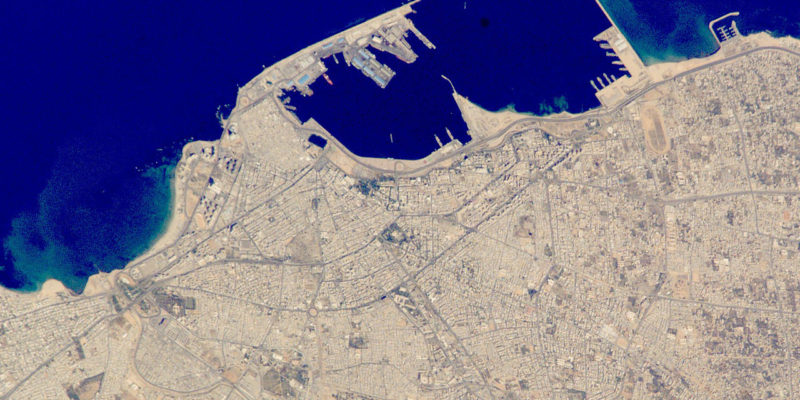1. Pope Francis takes a stand against violence in Libya; migrants trapped as rival militias fight
Following the intervention of the Italian Bishops’ Conference in the Diciotti case, new details have emerged: Vita writes that Pope Francis has brought the standoff to a close, and that the pontiff has asked to see the footage of the violence against migrants in Libya, which prompted him to take a stand against pushbacks. Famiglia Cristiana has released shocking footage documenting the violence in Libyan detention camps.
New clashes have erupted among Libyan militias for the control of Tripoli, leaving dozens dead. These clashes often mean that migrants find themselves trapped or in grave danger (we wrote about it here after the battle of Sabratha, back in October); but this time, as reporter Sally Hayden recounts in this Twitter thread, after being in touch with several NGOs on the ground, migrants detained in the Ain Zara camp were trapped during the attack, fearing that the guards would sell them to a militia or into forced labour.
The UNHCR has announced that it has moved detained refugees out of harm’s way.
2. Diciotti migrants recount their ordeals, Casa Pound protests arrival in Rocca di Papa
The migrants from the Diciotti have started to share their stories. In addition to rape and torture, there were also 16 babies born in underground prisons in Libya who died before they were released. These are the tales of the 100 migrants who were brought to Rocca di Papa to be redistributed among the local dioceses. Far-right group Casa Pound staged a protest upon their arrival, but a reaction from Ivano Ciccarelli, a local resident, went viral instead.
Meanwhile, Agrigento prosecutor Patronaggio, who is preparing the papers for the Palermo court, has asked for the names of all the people who were disembarked from the Diciotti, as each one of them has a right to file suit against interior minister Salvini.
Writing for Internazionale, Annalisa Camilli explains the situation after the Diciotti case.
3. 15,000 people in Milan to protest Salvini and Orbán, who are forming an anti-migration front
15,000 people gathered in Milan last Sunday to protest the meeting of Italian interior minister Matteo Salvini and the Hungarian prime minister Orbán. As the Guardian has reported, the two are forming an anti-migration front.
4. The Aquarius in Marseille, Open Arms moves to Spain, Sea Watch blocked
More and more often NGO rescue ships are being forced to leave critical areas in the central Mediterranean. After being held in Barcelona, the Open Arms has decided to continue rescue operations in Spanish waters. Meanwhile, Sea Watch is still being held in Malta with no official explanations, and the Aquarius is in the port of Marseille again for resupply operations. Last week Open Migration published Matteo Civillini’s report on the costs of escorting the Aquarius to Spain after it was denied a docking port in Italy: 290,000 euros for one of the two military ships alone; for both, presumably, twice as much. Italy might have to repay the EU funds.
Neapolitan author Valeria Parrella wrote a rare op-ed on what it means to help people by working with NGOs, relating her sister’s experience.
5. Nigerian migrants rebel against Casamonica clan
Following the attempted murder of a Nigerian man prosecutors investigating the Casamonica clan have discovered that a group of Nigerian migrants staged a rebellion against the network, demanding proper contracts for their leased apartments.
6. Australia, dozens of migrants missing in crocodile-infested rainforest after boat sinks
A boat sank near the mouth of the Daintree River in Australia, with dozens of migrants, mostly Vietnamese, on board. They are believed to be hiding in mangrove forests, infested with crocodiles, to avoid discovery by the Australian police, who have already detained ten of the survivors.
7. A migrant hunt by the far right in a German town
Following the killing of a German citizen and the possible involvement of a Syrian and an Iraqi citizen, about a thousand members of far-right groups held a violent protest in Chemnitz, Germany, targeting foreigners and injuring at least two.
8. Minors threaten to commit suicide at the Moria refugee camp
The situation on the Greek islands is critical due to overcrowding, administrative standstills, and growing restlessness from local communities. MSF aid workers have voiced their concerns about desperate minors at the Moria camp, who have threatened to commit suicide.
Meanwhile, on Lesbos, Greek police are prosecuting an NGO under charges of facilitating illegal immigration. Among the arrested was 23-year-old Syrian Sara Mardini, who is now living in Germany and who had been hailed as a hero for helping other migrants at sea with her swimming skills.
9. A community radio for Rohingya refugees
Kutupalong, in Bangladesh, is the enormous camp where 600,000 Rohingya refugees have been living in huts on dirt roads since fleeing persecution in Myanmar. Giuliano Battiston wrote about it in his report, and today Kutupalong has its own community radio station.
10. An atlas of migrations proves there is no invasion
La Repubblica’s digital lab has created a graphic atlas of migrations in order to help people visualise migrant flows, movements from countries of origin, and the main destinations.
Cover image: satellite image of central Tripoli (Wikipedia)









